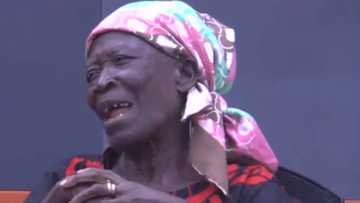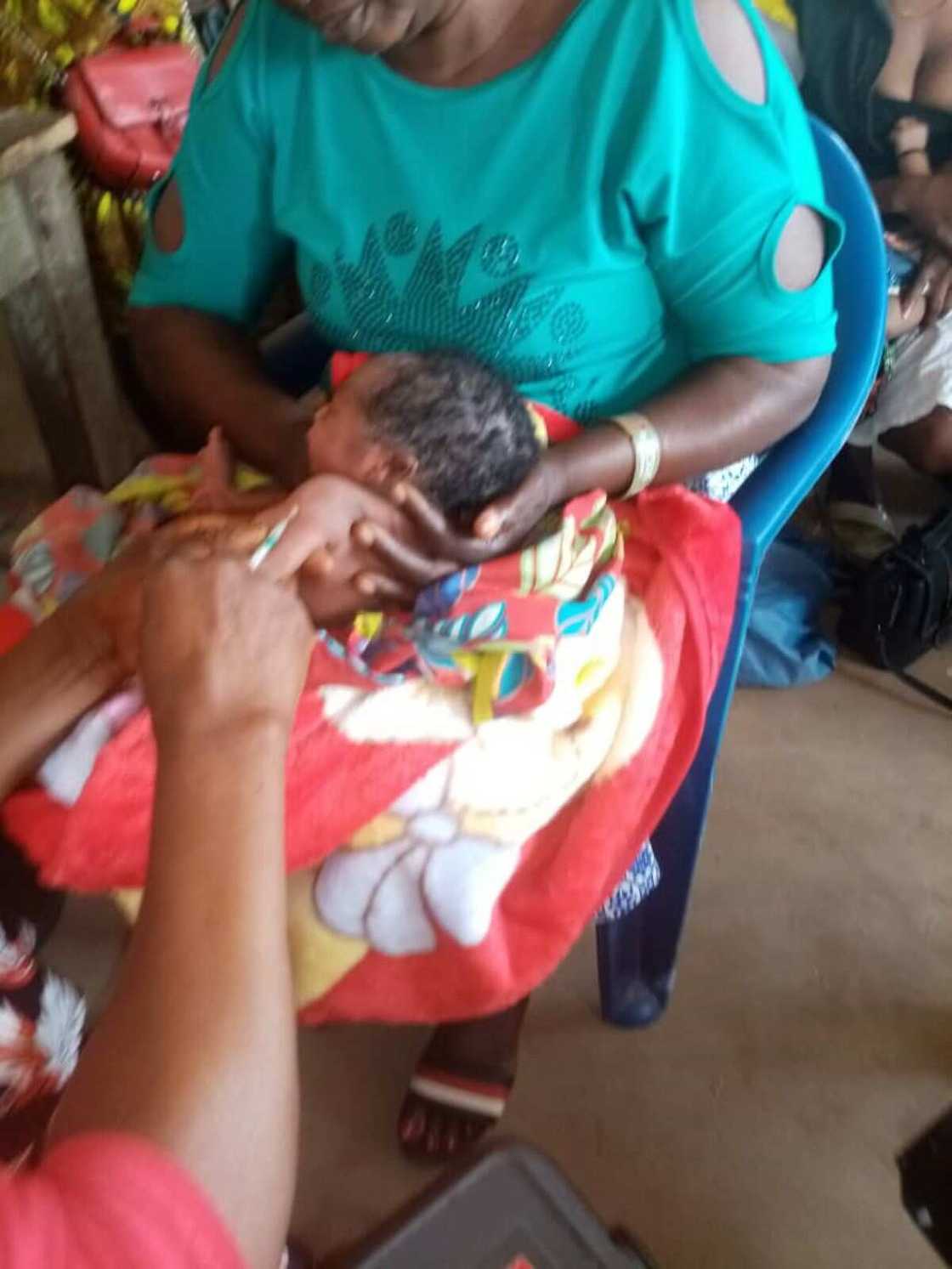Routine Immunization: My Last Child Must Be Vaccinated, Mother of 7 Vows, Gives Reasons
- Mothers across the country are regularly advised to ensure their children are immunised against killer diseases that could be fatal to the lives of children under the age of five-years-old
- Some of the diseases that children are vaccinated against include Rotavirus, Diphtheria, tetanus and acellular pertussis, Haemophilus influenza, Pneumococcal conjugate among others
- A mother of seven who failed to immunise six of her children has vowed to ensure that her last child is fully vaccinated
As Iveren Amase, a 37-year-old, mother of seven sits patiently among other women and children on a concrete bench, she awaits her turn to vaccinate her two-month-old son, Tersoo.
This would be the first time Tersoo would be vaccinated and also the first of its kind for Iveren - she has never had any of her children vaccinated.
Sitting among the crowd in a local area at the Tse-Apaha outreach in Gwer East local government area of Benue state, Iveren said she was determined to ensure that the routine measles vaccination is administered for her two-month-old son.

Read also
I will never break up with my dead husband, he is always with me: Widow makes stunning revelation in video

Source: UGC
According to her, the dream of having a healthy family was aborted as her husband had negative beliefs about vaccinations or routine immunisation for children.
PAY ATTENTION: Install our latest app for Android, read best news on Nigeria’s #1 news app
This, coupled with the distance from their home to the health care facilities denied her six children of routine immunization.
She said:
"I was initially sceptical about coming for routine immunization because my husband said it reduces life span and is evil, though lately permitted me to if I could afford transport fair to the primary health care facility."
"But unfortunately, I could not afford a transportation fare to take my children for immunization."
Dangers of not vaccinating children routinely
Speaking on what motivated her to ensure her seventh child is vaccinated, Iveren said her first set of children were frequently sick and as a result.

Read also
2021 in review: 5 couples who welcomed kids after many years in marriage, 1 of them gave birth to quadruplets
As a result, she became a weekly visitor to the health facility in her community in order to get medical care for her children.
Narrating further, the mother of seven children said she barely had time to attend to her crops on the farm as a result of the challenge.
She said:
"My friend's children are healthy and rarely falls sick, when I asked her she told me she has never missed routine immunization for her children."
“My first six children were not as lucky as Tersoo, now that the vaccination centre is close to my house, I do not want him to miss the vaccine."
Iveren regrettably said:
"I will make sure he takes all the required doses to the final one."
According to Nigeria's health ministry, every child should get at least six vaccines against killer diseases, including polio, in their first year of life. A child that misses any could be in danger.
Immunisation saves the lives of millions of children
Every year, millions of lives are saved due to routine immunization, which is widely recognized as one of the most successful and cost-effective public health interventions.
However, in Nigeria, over three million children under one year are still either unvaccinated or under-vaccinated.
This seems to worsen as the world struggles to tackle the COVID-19 pandemic, there is a significant risk that more children will miss out on life-saving vaccines that can prevent diseases like measles and polio.
Interventions in LGAs with support from UNICEF
To ensure all eligible children are vaccinated and communities protected from vaccines - preventable disease outbreaks, the United Nations Children’s Fund (UNICEF), in July 2021 rolled out a funded programme tagged 'Routine Immunization Intensification' in ten (10) local government areas of Benue state.
The programme targeted the higher numbers of unvaccinated children under the age of five which includes; Ado, Gwer-East, Gwer-West, Guma, Gboko, Kwande, Vadekyia, Konshisha, Ohimini and Ukum
A community sensitization programme on routine vaccinations, the programme has also been scaled up in recent weeks, and have included door to door dissemination of important information materials.
These have also entailed consistent engagements with traditional and religious leaders, who play a key role in mobilizing their communities.

Read also
No scars, no head wounds: Fani-Kayode releases video of sons playing as ex-wife tearfully begs to see them
With its partners, UNICEF supplies vaccines to reach 45 per cent of the world’s children under five. In conjunction with governments, the private sector, non-governmental organizations, and other United Nations (UN) agencies to engage communities, procure and distribute vaccines, keep supplies safe and effective, and help ensure affordable access for even the hardest-to-reach families.
Anbiam Comfort, a routine immunisation ward focal person (RIWFP) and a health care practitioner, who administers vaccines at Comprehensive Health care, Aliade, said there has been a marked improvement in turnout compared to the beginning of the pandemic.
She said:
“Initially, we had the challenge of low turnout from both health workers and caregivers who were scared to come to health facilities for fear of infection and lack of transportation fair."
“But now they have been educated about immunization and have seen the reasons why they should ensure their children are vaccinated through the health volunteer programme initiated by UNICEF in various outreaches."
"We also give “BCG, HPV, Hepatitis B, Vatamin A, other immunizations as well as birth registration."
Adding that immunization is carried out daily at the outreach centres but Wednesdays are fun days as there are more women who come out not just for immunization but to interact and network.

Read also
Sokoto killing: 30-year-old widow reveals how she watched helplessly as bandits burnt her mum, 4 kids to death
At the local hospital in Benue state, there are more than enough vaccines to go around, but there is the inadequacy of manpower to ensure these vaccines gets to the eligible children in the hard to reach (remote) areas in the LGA.
This disclosure was made by the local government immunization officer for Gwer East Aliade, Jethro Masev.
Masev while highlighting further on challenges hindering effective vaccination in some areas of the LGA, said mobility is another challenge faced by volunteers workers to access the targeted areas.
As Nigeria tackles vaccine-preventable disease deliberate efforts must also be made to employ more /adequate Manpower to ensure vaccines made available by donors like UNICEF does not go wasted but timely reach the targeted populace.
HIV in infants: Health workers advised to incorporate testing into every care plan
Health workers have been advised to remain vigilant in their effort to detect HIV infection in children.
The advice was given to health workers by Dr Atana Ewa, a chief consultant and associate professor at the University of Calabar Teaching Hospital.
Ewa said health workers across Nigeria should endeavour to incorporate HIV/AIDS testing into all care plans.

Read also
Parents, we need to pray fervently: Mercy Aigbe in tears as trailer kills some Lagos students, shares video
A report says 490 Nigerian babies born in 2020 tested positive for HIV
Women across Nigeria have been advised to ensure their children are tested for HIV at birth and continually over their childhood life.
This advice was given by Dr Gbenga Ijaodola, a team lead, at the National AIDS and STIs Control Program (NASCP) of the Federal Ministry of Health.
Ijaodola said most babies are infected with HIV because their mothers fail to access antenatal care facilities across the country.
Source: Legit.ng



